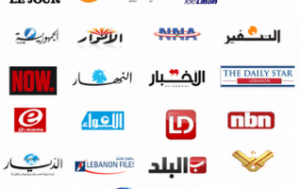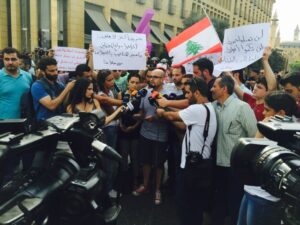Ethics, Framing, and Agenda-Setting
According to an article by the BBC, Lebanon has been one of the more progressive countries in the Middle East when it comes to media, for it was the first country to allow privatized radio stations. Additionally, much of the broadcast media in Lebanon is privately owned. However, most of the media is controlled by politicians who dictate the agenda for reporting. A piece by rsf states that this is because politicians invest into the media stations so that media stations have the funding to run their programs.

An issue that occurs when politics are so closely tied to the media is whether or not the people can trust the media when it is so heavily influenced by government figures. Do Lebanese citizens trust the media? Also, are journalists providing accurate information about topics or do they feel pressure from politicians to report mis-truths about certain topics? If they do feel pressure from politicians, does this pressure come from explicit instructions from politicians on how to report an issue, or do they feel that in order to continue to receive funding they need to keep the government happy? Or, in their framing do they simply not investigate certain topics at all because they would be too controversial? Ways to investigate these issues would be to look into polls that ask Lebanese citizens if they like or trust their local media, or if they feel that the media is too controlled by politicians. Also, looking into glaring holes in coverage on certain issues can answer questions about how much influence politicians have over the media. If certain topics that may upset the government are not covered it may be due to governmental sway over media. However, many of these questions would be difficult to find hard, solid answers to without having explicit documentation or proof of direct governmental orders given to the media on what topics they should discuss.
Investigation, Activism, and Censorship
While politicians certainly have a level of hold over the media, Lebanese media is still cited by the BBC as being one of the bolder, more controversial media in the Middle East. Furthermore, after the Beirut explosion in 2020 and the financial crisis that followed, more pressures have been put on both media and politics that have caused the media to become even more emboldened, especially when it comes to critiquing politics. An article written by Fatima Bahja discusses how more investigative journalism is being conducted in Lebanon in order to fully and accurately report on immediate and current issues, but Bahja explains that journalists often struggle to find access to information and work hard to uncover what little they can for their is little legal help journalists receive.

Media and journalists certainly make great attempts to be activists in their community; however, how much their attempts at activism are hindered by political parties hold on them through financial investments and the lack of support from the legal sphere is worth looking into. Additionally, Bahja discusses how investigations are hindered by censorship from the government. The government has pursued legal action against certain journalists for their publications. Other types of censorship like pre-censorship is not discussed in Bahja’s article. Additionally, Bahja does not discuss how these legal actions against certain reporters has affected self-censorship. Conducting research into pre-censorship, self-censorship, and the types of laws set against journalists in their reporting and investigating are utterly crucial in order to determine the extent of censorship in the region.
Unknown. 2015. Activists hold an impromptu press conference in downtown Beirut. In “A new era for Lebanese journalism?” https://www.beirutreport.com/2015/12/a-new-era-for-lebanese-journalism.html
“Logos of different Lebanese Media.” In “The Myth of Media Freedom in Lebanon.” https://www.tasharuk.net/en/resources/index.php?id=1073
One response to “Link Between Politics/ Government and Media in Lebanon”
This is a really stimulating post on how one might apply concepts related to ownership and media processes to generate a lot of exciting questions about Lebanese media. Later in the course we will dive into some of these specific questions, but it is great to see you already thinking so productively about these core concepts.